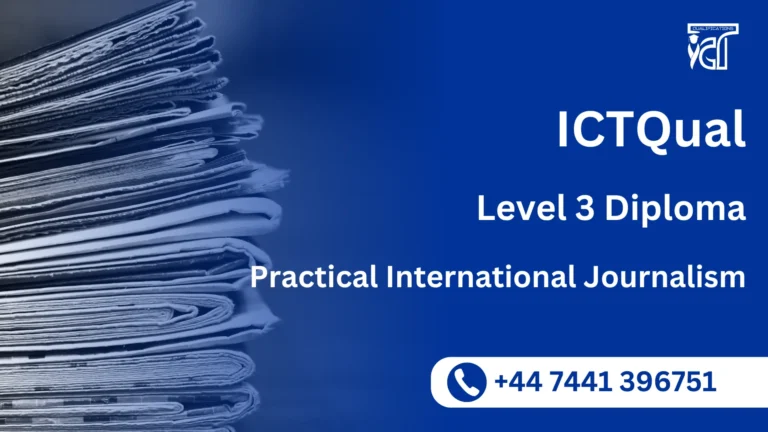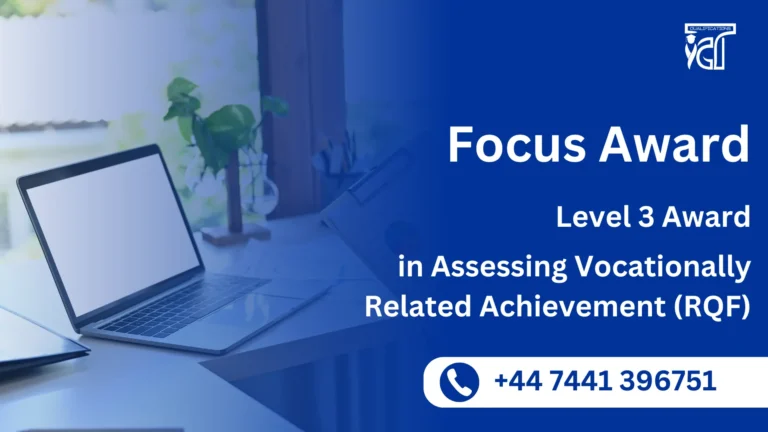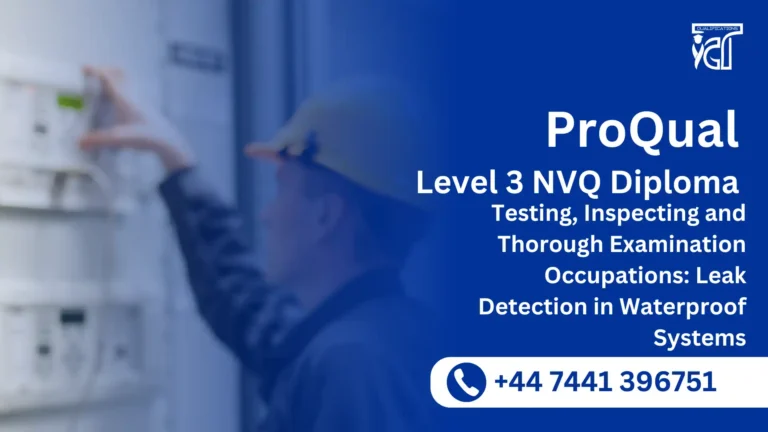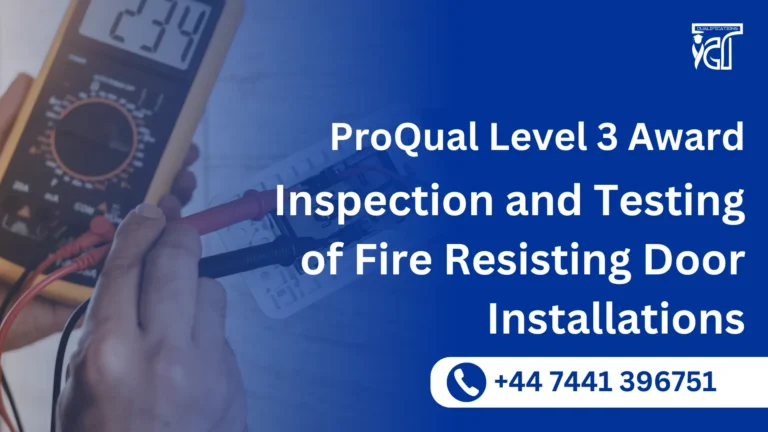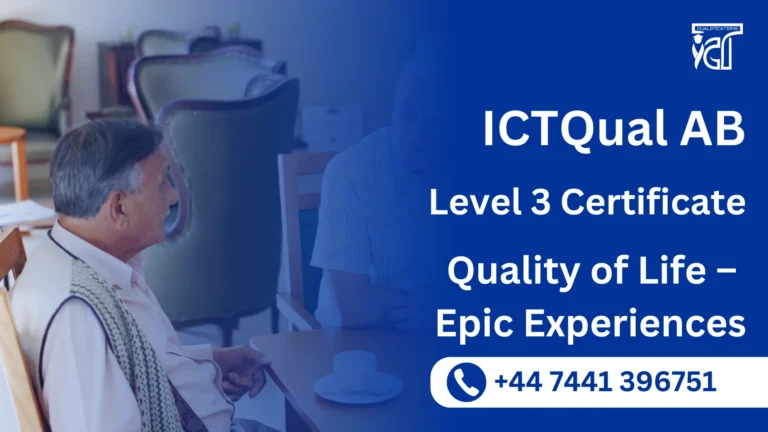The Focus Awards Level 3 Certificate in Assessing Vocational Achievement (RQF) is a highly regarded qualification designed for individuals who are looking to develop their skills and knowledge in vocational assessment. Whether you’re a seasoned assessor or aspiring to take on the role, this qualification equips you with the essential tools needed to assess learners’ competence in real-world vocational settings. As an Ofqual-regulated qualification, it is recognized by employers and educational institutions across the UK and beyond. What sets this qualification apart is its entirely assignment-based assessment, allowing learners to demonstrate their competence in practical, work-based scenarios.
The Focus Awards Level 3 Certificate in Assessing Vocational Achievement (RQF) is designed to provide learners with the knowledge and skills required to assess vocational achievements across a wide range of settings. This qualification is suitable for individuals who assess learners in the workplace or in training environments. It is perfect for professionals in education and training who want to formally recognize their skills as assessors, or those looking to enter the field of assessment.
With a focus on understanding assessment processes and how to evaluate competence effectively, this qualification ensures that assessors are able to support learner achievement while maintaining industry standards. The assessment is entirely assignment-based, meaning there are no exams – instead, learners complete practical assignments that reflect their day-to-day role as an assessor.
The Focus Awards Level 3 Certificate in Assessing Vocational Achievement (RQF) is a comprehensive qualification that covers all the key aspects of vocational assessment. It enables assessors to understand how to plan and carry out assessments, provide constructive feedback, and manage the assessment process in a way that is effective, fair, and supports learners’ development.This qualification is Ofqual-regulated, ensuring that it meets high-quality standards and is recognized across a variety of industries.
The Focus Awards Level 3 Certificate in Assessing Vocational Achievement (RQF) is a comprehensive and practical qualification that is essential for anyone involved in vocational assessment. With its Ofqual-regulated status, global recognition, and entirely assignment-based structure, this course ensures that learners can apply what they’ve learned in real-world assessment situations, setting them up for success in their careers.
Whether you’re an existing assessor looking to formalize your skills or someone new to the profession, this qualification offers a structured and flexible approach to becoming a certified assessor. Enroll today and take the next step toward advancing your career in vocational assessment.
Focus Awards Level 3 Certificate in Assessing Vocational Achievement (RQF)
The Focus Awards Level 3 Certificate in Assessing Vocational Achievement (RQF) qualification, to achieve learner must achieve 15 credits, 150 TQT and 84 GLH from these mandatory units.
| Sr# | Unit Title | Credit | GLH |
|---|---|---|---|
| 1 | Understanding the principles and practices of assessment | 3 | 24 |
| 2 | Assess occupational competence in the work environment | 6 | 30 |
| 3 | Assess vocational skills, knowledge and understanding | 6 | 30 |
GLH (Guided Learning Hours) and TQT (Total Qualification Time) are terms commonly used in vocational qualifications to help define the amount of time a learner is expected to spend on their studies.
1. GLH (Guided Learning Hours)
GLH refers to the number of hours a learner spends being directly taught, supervised, or supported during their course. This includes the time spent in activities such as:
- Classroom instruction
- Practical workshops
- One-on-one tutoring or mentoring sessions
- Online learning sessions with tutor support
In other words, GLH represents the time that learners are actively engaged with their instructors or learning activities.
2. TQT (Total Qualification Time)
TQT represents the total amount of time a learner is expected to invest in completing a qualification, including:
- GLH (Guided Learning Hours): Time spent on direct learning, as explained above.
- Self-Directed Learning: This includes time spent on independent study, research, assignment completion, preparation for exams, and any other work the learner does outside of direct teaching hours.
TQT is a broader measure that includes all the time required to achieve the qualification. It helps learners and employers understand the overall commitment required for the qualification.
Key Differences Between GLH and TQT:
- GLH focuses on direct learning with guidance or supervision.
- TQT includes GLH as well as independent study time and other learning-related activities.
Example:
If a qualification has a TQT of 600 hours and a GLH of 250 hours, it means the learner should spend 250 hours in direct learning (classroom, online, or tutor-led sessions) and 350 hours on independent study or research.
Here are the learning outcomes based on the study units you provided for the Focus Awards Level 3 Certificate in Assessing Vocational Achievement (RQF):
Unit 1: Understanding the Principles and Practices of Assessment (3 Credits, 24 Guided Learning Hours)
Learning Outcomes:
- Understand the role and responsibilities of an assessor:
- Explain the responsibilities of the assessor in relation to learners, colleagues, and organizations.
- Understand the ethical and legal obligations involved in assessment.
- Understand the principles and practices of assessment:
- Describe the key principles of assessment (validity, reliability, fairness, and sufficiency).
- Explain the different assessment methods and their relevance in different contexts.
- Understand the requirements for assessing vocational achievement:
- Identify the specific requirements for assessing vocational achievement in different sectors.
- Recognize the standards of competence needed to ensure assessments meet industry and regulatory requirements.
- Understand how to plan assessments:
- Develop a clear understanding of how to plan an assessment process that aligns with learners’ needs and organizational goals.
Unit 2: Assess Occupational Competence in the Work Environment (6 Credits, 30 Guided Learning Hours)
Learning Outcomes:
- Understand the process of assessing occupational competence in the work environment:
- Explain the process for assessing competence in the workplace, including identifying relevant skills and knowledge.
- Assess work-based evidence to evaluate competency.
- Evaluate the performance of the learner in real work situations:
- Assess learners’ performance in authentic work environments, ensuring that it meets the required occupational standards.
- Use appropriate assessment methods and techniques in the workplace:
- Identify suitable assessment methods to gather evidence of competence within the work environment.
- Select and apply methods such as observation, questioning, and reviewing work products.
- Provide feedback to learners on performance in the workplace:
- Offer constructive and clear feedback to learners about their performance in the work environment, supporting their development and improvement.
Unit 3: Assess Vocational Skills, Knowledge, and Understanding (6 Credits, 30 Guided Learning Hours)
Learning Outcomes:
- Ensure all assessments are conducted fairly, considering individual learner needs while maintaining consistency and reliability in assessing vocational skills, knowledge, and understanding.
- Understand the process of assessing vocational skills, knowledge, and understanding:
- Understand the importance of assessing both practical skills and theoretical knowledge to ensure comprehensive vocational competence.
- Apply appropriate methods to assess a learner’s knowledge and understanding alongside their practical skills.
- Assess learners’ knowledge and understanding in a vocational context:
- Use a range of assessment methods (e.g., written tests, projects, assignments) to assess learners’ understanding of vocational concepts and theories.
- Use effective questioning and feedback techniques:
- Develop and apply effective questioning techniques to assess learners’ depth of knowledge.
- Provide feedback that helps learners understand their strengths and areas for development.
- Ensure the assessment is fair and consistent:
Benefits of the Focus Awards Level 3 Certificate in Assessing Vocational Achievement (RQF)
The Focus Awards Level 3 Certificate in Assessing Vocational Achievement (RQF) offers numerous benefits for individuals looking to advance their careers in vocational assessment and education. Here’s why this qualification stands out:
1. Ofqual Regulated and Industry-Recognized
- The Focus Awards Level 3 Certificate in Assessing Vocational Achievement is Ofqual-regulated, meaning it adheres to strict academic and regulatory standards. This gives the qualification credibility with employers, educational institutions, and regulatory bodies across the UK and internationally.
- With its recognition in various sectors, this qualification opens doors to career opportunities globally, especially in industries that require skilled assessors.
2. Flexibility through Assignment-Based Learning
- The qualification is entirely assignment-based, which means learners can complete practical assignments that mirror real-world scenarios. This flexible approach allows individuals to apply the concepts learned directly to their workplace or vocational settings.
- With no exams, learners are evaluated based on their ability to carry out assessments in a practical and relevant manner, making this approach suitable for busy professionals who prefer hands-on learning.
3. Improved Career Prospects and Opportunities
- Holding the Level 3 Certificate in Assessing Vocational Achievement (RQF) is a valuable asset in a variety of industries such as education, healthcare, business, manufacturing, and construction. This qualification enables individuals to take on roles such as vocational assessor, trainer, quality assurance officer, or learning and development specialist.
- It provides a clear pathway for career advancement, helping individuals move into more senior positions, including management or leadership roles within training and development sectors.
4. Enhanced Understanding of Assessment Practices
- This qualification ensures learners are thoroughly equipped with a deep understanding of assessment principles, techniques, and practices. By mastering these skills, assessors can evaluate learner achievement with greater effectiveness and consistency, which is essential for ensuring high standards in vocational education.
- Learners will gain an understanding of how to assess both vocational skills and theoretical knowledge, ensuring a holistic approach to learner evaluation.
5. Compliance with Industry Standards
- The Focus Awards Level 3 Certificate helps professionals ensure that their assessment practices meet industry standards and legal requirements. This qualification equips assessors with the knowledge necessary to follow the correct processes, ensuring fairness, reliability, and validity in assessments.
- Understanding compliance also reduces the risk of errors and ensures that assessments meet regulatory standards, making this course highly valuable for sectors that are heavily regulated.
6. Boosts Learner Engagement and Development
- As an assessor, gaining this qualification will help individuals deliver constructive feedback and assessments that are learner-centered, ultimately helping learners develop their skills and reach their potential.
- Effective assessment contributes to the continuous improvement of learners by identifying their strengths and areas for development, which promotes greater learning outcomes.
7. Builds Professional Credibility
- Completing the Focus Awards Level 3 Certificate enhances professional credibility and status within the vocational training industry. The qualification shows a commitment to improving and formalizing one’s assessment practices.
- It provides employers with confidence that an individual possesses the competence and expertise required to assess vocational achievements effectively.
8. Ideal for Career Changers
- This qualification is a great option for individuals transitioning into vocational assessment roles. It provides a structured approach to understanding assessment processes and practices, allowing those with limited experience in assessing to develop the skills needed to succeed.
9. Opportunities for Further Progression
- After completing the Level 3 Certificate, learners can progress to higher-level qualifications such as the Level 4 Certificate in Leading the Internal Quality Assurance of Assessment Processes or Level 4 Awards in Internal Quality Assurance, opening up advanced career paths in quality assurance and assessment leadership.
- For those pursuing a career in teaching or vocational training, this qualification can also serve as a foundation for pursuing teacher training qualifications and moving into academic roles.
10. Helps Improve Organizational Performance
Having properly qualified assessors ensures that organizations meet regulatory requirements and maintain high standards in their vocational training and assessments.
Employers benefit from having qualified assessors on their team, as they will help ensure the quality and accuracy of assessments. This directly impacts the efficiency and effectiveness of vocational training programs, leading to better-trained and more competent staff within the organization.
Who Is the Focus Awards Level 3 Certificate in Assessing Vocational Achievement (RQF) Best Suited For?
The Focus Awards Level 3 Certificate in Assessing Vocational Achievement (RQF) is an ideal qualification for a wide range of professionals who are involved in vocational training, education, and assessment. This course is specifically designed for those who wish to formalize their expertise in assessing vocational achievement and those who are looking to expand their role in the training and development field. Below are the individuals and roles who will find this course most beneficial:
1. Current or Aspiring Vocational Assessors
- This qualification is perfect for individuals currently working as vocational assessors who wish to formalize their knowledge and expertise or those seeking to advance their career.
- Whether you’re assessing learners in the workplace or training environment, this qualification ensures you’re equipped with the necessary skills and understanding to assess vocational competence effectively.
2. Workplace Trainers and Mentors
- Trainers and mentors within various industries (such as healthcare, construction, engineering, business, etc.) who need to assess their learners’ skills and performance will greatly benefit from this course.
- This qualification will equip trainers with the essential skills to assess competency in real work environments while providing constructive feedback to support their learners’ development.
3. Education and Training Professionals
- Teachers, instructors, and educators who wish to assess vocational skills and knowledge in educational or training settings will find this course highly relevant.
- It enhances their ability to evaluate learner achievements effectively, whether in classroom-based environments or workplace assessments.
4. Individuals Seeking to Transition into Assessment Roles
- For individuals looking to move into vocational assessment from other areas of training or teaching, this course provides a clear pathway. It’s an excellent starting point for people new to the role of an assessor and provides the foundational knowledge necessary to begin a career in this field.
5. Managers and Supervisors in Vocational Industries
- Managers, supervisors, and team leaders who oversee and evaluate the performance of employees in vocational sectors can gain valuable skills from this qualification. Understanding how to assess competence accurately will improve their ability to support staff development and ensure industry standards are being met.
6. Learning and Development (L&D) Professionals
- L&D professionals responsible for developing and delivering training programs can use this qualification to enhance their assessment and evaluation techniques, ensuring that assessments are aligned with organizational objectives and meet compliance standards.
7. Human Resource Professionals and Quality Assurance Specialists
- HR professionals and quality assurance specialists working within training departments or industries where employee performance and vocational competence are assessed will find this qualification valuable. It will help them ensure consistency, fairness, and regulatory compliance in assessment practices.
8. Self-Employed Assessors and Consultants
- Those interested in becoming independent assessors or assessment consultants can greatly benefit from this qualification. The assignment-based learning and practical focus make it an ideal choice for individuals offering assessment services to different organizations or training providers.
9. Professionals in Regulated Sectors
- Individuals working in regulated sectors like healthcare, engineering, and construction, where competency assessments are critical for compliance, will find this course vital. It ensures assessors are well-versed in industry regulations, helping organizations maintain compliance with external standards.
Entry Requirements
Register Now
Qualification Process
Qualification Process for the Focus Awards Level 3 Certificate in Assessing Vocational Achievement (RQF)
- Self-Assessment:
Begin by evaluating your eligibility to ensure you meet the qualification requirements, including work experience, knowledge, and language proficiency. - Registration:
Complete your registration by submitting the required documents, including a scanned copy of a valid ID, and paying the registration fee. - Induction:
An assessor will conduct an induction to confirm your eligibility for the course and explain the evidence requirements. If you do not meet the criteria, your registration will be canceled, and the fee will be refunded. - Assignmnets & Evidence Submission:
Provide all assignmnets and the necessary evidence based on the assessment criteria outlined in the course. If you are unsure of the required evidence, consult with the assessor for guidance on the type and nature of evidence needed. - Feedback and Revision:
The assessor will review your submitted evidence and provide feedback. Evidence that meets the criteria will be marked as “Criteria Met,” while any gaps will be identified. You will be asked to revise and resubmit if needed. - Competence Evidence:
Submit final evidence demonstrating that all learning outcomes have been met. This evidence will be marked as “Criteria Met” by the assessor once it is satisfactory. - Internal Quality Assurance (IQA):
The Internal Quality Assurance Verifier (IQA) will review your evidence to ensure consistency, quality, and compliance with standards. - External Verification:
The IQA will submit your portfolio to Focus Award External Quality Assurance Verifiers (EQA) for final confirmation. The EQA may contact you directly to verify the authenticity of your evidence. - Certification:
Upon successful completion of all checks, FOCUS AWARD will issue your official certificate, confirming that you have attained the Focus Awards Level 3 Certificate in Assessing Vocational Achievement (RQF).


